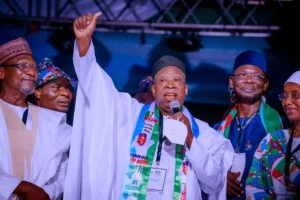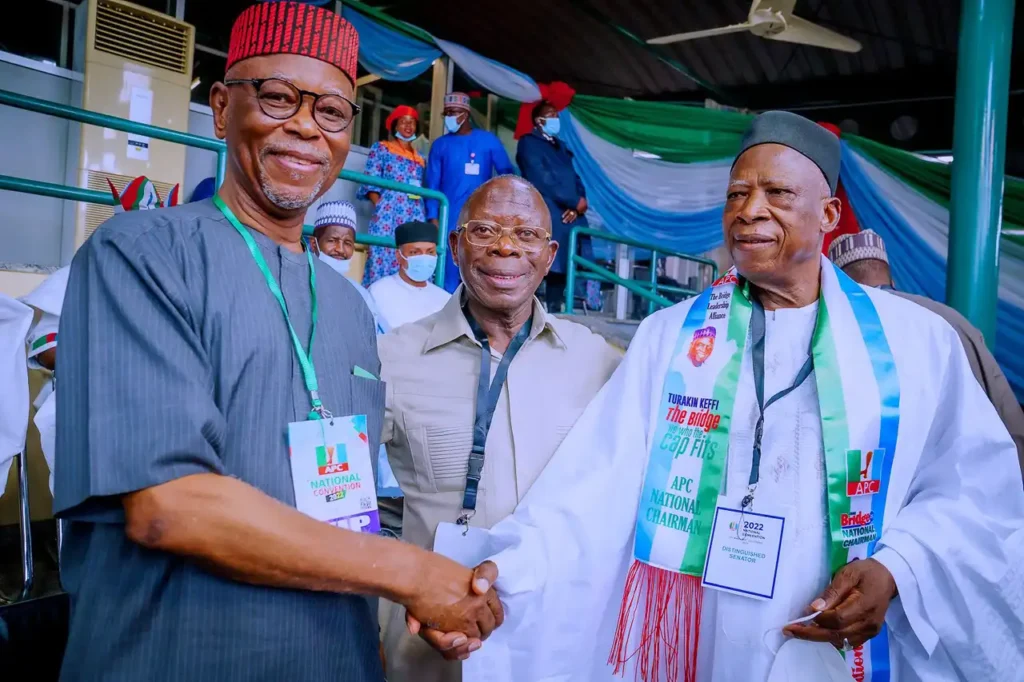the All Progressives Congress (APC) officially confirmed Senator Abdullahi Adamu as the party’s new National Chairman following a highly contested yet ultimately uncontested national convention held at Eagle Square, Abuja. The process, which was intended to reflect party unity, instead generated significant public debate due to its heavy reliance on a consensus arrangement largely attributed to the influence of President Muhammadu Buhari.
Rather than a competitive vote, Adamu’s selection was ratified through a voice vote by delegates, after all six other aspirants unexpectedly stepped down—reportedly under pressure from the presidency. The decision to elect Adamu through affirmation rather than balloting was defended by party leaders as a measure to avoid internal conflict. However, critics viewed it as another sign of shrinking internal democracy within Nigeria’s ruling party.

Presidential Endorsement Plays Central Role in Power Shift
Adamu’s emergence was anything but spontaneous. In the days leading up to the convention, party governors and other stakeholders reached a backroom agreement to adopt him as the consensus candidate. President Buhari himself had previously signaled his preference for Adamu, prompting other aspirants—such as George Akume and Tanko Al-Makura—to withdraw and endorse the former Nasarawa governor.
In a joint letter of withdrawal, the aspirants cited the need to respect party unity and Buhari’s leadership. However, the method of selection and the tone of the convention led to widespread concerns that the party was bypassing democratic processes in favor of top-down imposition.
Who Is Abdullahi Adamu?
A seasoned politician, Abdullahi Adamu previously served as governor of Nasarawa State from 1999 to 2007 and held a senatorial seat from 2011 until his appointment as APC chairman in 2022. Known for his strong ties to President Buhari, Adamu was chosen to lead the party into the high-stakes 2023 general elections.
His confirmation marked the end of the tenure of the APC’s Caretaker Committee, led by Mai Mala Buni, the Yobe State Governor who had managed party affairs since 2020.
Rising Tensions and Discontent Within APC Leadership
Although the consensus strategy achieved a short-term sense of unity, it sowed seeds of tension within the party’s hierarchy. In the months following his confirmation, several members of the APC’s National Working Committee (NWC) began to express frustration over Adamu’s leadership approach.
Notably, Salihu Lukman, the APC Vice Chairman for the North-West, publicly accused Adamu of running the party without consultation, delaying key processes such as the screening of candidates, and often waiting on presidential directives before making decisions. This leadership style, many argued, weakened the autonomy of the party’s internal organs.
Short Tenure Marked by Conflict and Internal Crisis
Adamu formally assumed the chairmanship on March 31, 2022, in a handover ceremony with Buni. As chairman, he oversaw the party’s preparations for the 2023 elections. Despite initial optimism, Adamu’s tenure was marked by persistent criticism. His inability to unite the party’s internal factions and poor handling of the electoral process—particularly in his home state where the APC underperformed—dented his credibility.
By mid-2023, the discontent within the NWC had escalated. Reports emerged of growing opposition to Adamu’s leadership, including internal memos criticizing his unilateral decision-making. These tensions eventually culminated in his resignation in July 2023, after which Abubakar Kyari took over in acting capacity before Abdullahi Ganduje was later selected as substantive chairman.
The Larger Implication for APC and Nigerian Politics
The events surrounding Adamu’s emergence and resignation underscored a recurring issue in Nigerian party politics—the dominance of powerful individuals over institutional processes. While the consensus method was justified as a unity mechanism, many within the party and the broader public saw it as undermining the party’s democratic structure.
Adamu’s rise and fall also highlighted how intra-party disagreements and centralized leadership approaches can disrupt the cohesion and functionality of a ruling party. As APC prepares for future political challenges, observers continue to call for stronger internal mechanisms, transparent procedures, and respect for member participation to sustain its dominance.
In Summary
Senator Abdullahi Adamu’s ascent to the position of APC National Chairman on March 26, 2022, symbolized both the party’s desire for unity and the cost of sidelining democratic principles. Though he began his term with the backing of the presidency and party elites, internal dissatisfaction with his leadership style eventually led to his resignation within 16 months. His tenure remains a cautionary tale about the tension between centralized power and institutional democracy within Nigerian political parties.







